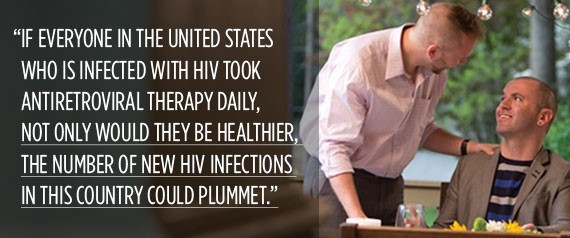
Antiretroviral treatment can enable HIV-infected Americans to avoid the debilitating illnesses and premature death once nearly inescapable for people with the infection. Research has shown that, when taken consistently, these medications also greatly reduce transmission of the virus to others.
In other words, if everyone in the United States who is infected with HIV took antiretroviral therapy daily, not only would they be healthier, the number of new HIV infections in this country could plummet.
The potential for HIV treatment to change the course of the epidemic by dramatically reducing sexual transmission and the number of new infections that occur each year and to change the course of the epidemic is the basis of a core CDC HIV prevention strategy -- and one embraced by the National HIV/AIDS Strategy. Namely, to ensure that all people with HIV know they have the virus, have access to treatment, take treatment daily, and minimize transmitting the virus to others.
The first critical step toward treating and preventing HIV infections is HIV testing. Knowledge of HIV status allows people who test positive to begin treatment for their own health and take steps to prevent transmission to others. Substantial progress has been made to expand HIV testing efforts and increase the percentage of Americans with HIV who are aware they're infected -- from 75 percent in 2003 to 84 percent in 2010 -- but simply knowing your status isn't enough.
One in five Americans who are diagnosed with HIV do not receive care within three months of diagnosis, and about half of those diagnosed with HIV do not receive continued care and treatment. This may be because they don't know where to go for HIV care in their communities, have trouble accessing health care, are afraid of being identified as HIV-infected or at risk, or have life circumstances that make receiving ongoing care difficult.
These are just a few reasons that only one-quarter of Americans living with HIV receive treatment and take their medication with enough regularity to suppress the infection in their bodies to levels that maximize health benefits and reduce the spread of HIV to others.
To ensure that people get the HIV treatment and care they need, CDC is supporting efforts on several fronts to link people to follow-up medical care as soon as they test HIV positive. CDC also is researching new ways to help people stay in care and on treatment once they start and is ensuring that every one of the state and local health departments and community organizations that CDC funds makes prevention services that include treatment for people living with HIV a priority.
CDC also worked with people living with HIV to develop a new communications campaign urging everyone with HIV to start and stay on treatment. The campaign, called HIV Treatment Works, includes ads, billboards, social media channels and community outreach featuring the faces and voices of real people living with HIV and on treatment.
One of these voices belongs to Aaron, a co-author of this piece, who was diagnosed with HIV in 2011. By sticking to his treatment plan and taking good care of his health, he is able to continue living his life to the fullest while at the same time using his experience to touch the lives of others with HIV. Aaron now dedicates himself to educating newly diagnosed people about HIV treatment and encouraging them not to give up -- even if they are feeling scared or frustrated.
These stories -- our stories -- are about how we can overcome the challenges many face in getting treatment and staying in care. It's about improving the health of individuals living with HIV, and helping them continue to lead meaningful lives -- while having the peace of mind that they are also helping to protect others and preventing the spread of HIV.
We need everyone to hear the message: HIV treatment works. It can save your life, protect your loved ones, and -- when combined with other high impact prevention strategies -- can ultimately help end the HIV epidemic in the United States.
To join the effort, visit the HIV Treatment Works website and learn what you can do.
